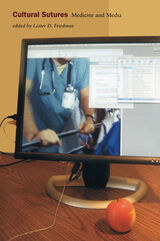
In this volume, scholars of cinema studies, philosophy, English, sociology, health-care education, women’s studies, bioethics, and other fields demonstrate how the world of medicine engages and permeates the media that surround us. Whether examining the press coverage of the Jack Kevorkian–euthanasia controversy; pondering questions about accessibility, accountability, and professionalism raised by such films as Awakenings, The Doctor, and Lorenzo’s Oil; analyzing the depiction of doctors, patients, and medicine on E.R. and Chicago Hope; or considering the ways in which digital technologies have redefined the medical body, these essays are consistently illuminating and provocative.
Contributors. Arthur Caplan, Tod Chambers, Stephanie Clark-Brown, Marc R. Cohen, Kelly A. Cole, Lucy Fischer, Lester D. Friedman, Joy V. Fuqua, Sander L. Gilman, Norbert Goldfield, Joel Howell, Therese Jones, Timothy Lenoir, Gregory Makoul, Marilyn Chandler McEntyre, Faith McLellan, Jonathan M. Metzl, Christie Milliken, Martin F. Norden, Kirsten Ostherr, Limor Peer, Audrey Shafer, Joseph Turow, Greg VandeKieft, Otto F. Wahl

In the 1850s, "Drapetomania" was the medical term for a disease found among black slaves in the United States. The main symptom was a strange desire to run away from their masters. In earlier centuries gout was understood as a metabolic disease of the affluent, so much so that it became a badge of uppercrust honor—and a medical excuse to avoid hard work. Today, is there such a thing as mental illness, or is mental illness just a myth? Is Alzheimer's really a disease? What is menopause—a biological or a social construction?
Historically one can see that health, disease, and illness are concepts that have been ever fluid. Modern science, sociology, philosophy, even society—among other factors—constantly have these issues under microscopes, learning more, defining and redefining ever more exactly. Yet often that scrutiny, instead of leading toward hard answers, only leads to more questions. Health, Disease, and Illness brings together a sterling list of classic and contemporary thinkers to examine the history, state, and future of ever-changing "concepts" in medicine.
Divided into four parts—Historical Discussions; Characterizing Health, Disease, and Illness; Clinical Applications of Health and Disease; and Normalcy, Genetic Disease, and Enhancement: The Future of the Concepts of Health and Disease—the reader can see the evolutionary arc of medical concepts from the Greek physician Galen of Pergamum (ca. 150 ce) who proposed that "the best doctor is also a philosopher," to contemporary discussions of the genome and morality. The editors have recognized a crucial need for a deeper integration of medicine and philosophy with each other, particularly in an age of dynamically changing medical science—and what it means, medically, philosophically, to be human.

In Replacement Parts, internationally recognized bioethicist Arthur L. Caplan and coeditors James J. McCartney and Daniel P. Reid assemble seminal writings from medicine, philosophy, economics, and religion that address the ethical challenges raised by organ transplantation. Caplan's new lead essay explains the shortfalls of present policies. From there, book sections take an interdisciplinary approach to fundamental issues like the determination of death and the dead donor rule; the divisive case of using anencephalic infants as organ donors; the sale of cadaveric or live organs; possible strategies for increasing the number of available organs, including market solutions and the idea of presumed consent; and questions surrounding transplant tourism and "gaming the system" by using the media to gain access to organs.
Timely and balanced, Replacement Parts is a first-of-its-kind collection aimed at surgeons, physicians, nurses, and other professionals involved in this essential lifesaving activity that is often fraught with ethical controversy.
READERS
Browse our collection.
PUBLISHERS
See BiblioVault's publisher services.
STUDENT SERVICES
Files for college accessibility offices.
UChicago Accessibility Resources
home | accessibility | search | about | contact us
BiblioVault ® 2001 - 2024
The University of Chicago Press









